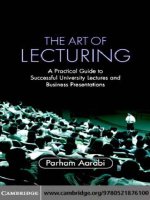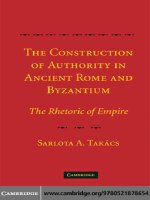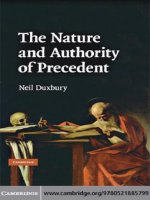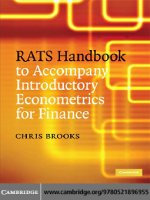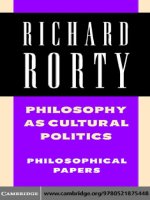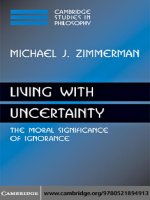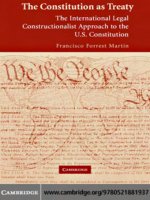cambridge university press a faustian foreign policy from woodrow wilson to george w bush dreams of perfectibility dec 2007 kho tài liệu bách khoa
Bạn đang xem bản rút gọn của tài liệu. Xem và tải ngay bản đầy đủ của tài liệu tại đây (2.76 MB, 318 trang )
P1: JZP
9780521879057pre
CUNY1134/Hoff
978 0 521 87905 7
This page intentionally left blank
ii
October 11, 2007
9:47
P1: JZP
9780521879057pre
CUNY1134/Hoff
978 0 521 87905 7
October 11, 2007
A Faustian Foreign Policy from Woodrow Wilson to
George W. Bush
A Faustian Foreign Policy from Woodrow Wilson to George W. Bush:
Dreams of Perfectibility critiques U.S. foreign policy during this period
by showing how moralistic diplomacy has increasingly assumed Faustian
overtones, especially during the Cold War and following September 11.
The ideological components of American diplomacy, originating in the
late eighteenth and nineteenth centuries, evolved through the twentieth
century as U.S. economic and political power steadily increased. Seeing
myth making as essential in any country’s founding and a common determinant of its foreign policy, Professor Joan Hoff reveals how the basic
belief in its exceptionalism has driven America’s past and present attempts
to remake the world in its own image. She expands her original concept of
“independent internationalism” as the modus operandi of U.S. diplomacy
to reveal the many unethical Faustian deals the United States has entered
into since 1920 to obtain its current global supremacy.
Joan Hoff is the former CEO and President of the Center for the Study
of the Presidency in New York City, former Executive Secretary of the
Organization of American Historians, and former Professor of History
and Director of the Contemporary History Institute at Ohio University.
She is now Research Professor of History at Montana State University,
Bozeman.
i
9:47
P1: JZP
9780521879057pre
CUNY1134/Hoff
978 0 521 87905 7
ii
October 11, 2007
9:47
P1: JZP
9780521879057pre
CUNY1134/Hoff
978 0 521 87905 7
October 11, 2007
A Faustian Foreign Policy from Woodrow
Wilson to George W. Bush
Dreams of Perfectibility
JOAN HOFF
Montana State University
iii
9:47
CAMBRIDGE UNIVERSITY PRESS
Cambridge, New York, Melbourne, Madrid, Cape Town, Singapore, São Paulo
Cambridge University Press
The Edinburgh Building, Cambridge CB2 8RU, UK
Published in the United States of America by Cambridge University Press, New York
www.cambridge.org
Information on this title: www.cambridge.org/9780521879057
© Joan Hoff 2008
This publication is in copyright. Subject to statutory exception and to the provision of
relevant collective licensing agreements, no reproduction of any part may take place
without the written permission of Cambridge University Press.
First published in print format 2007
eBook (EBL)
ISBN-13 978-0-511-36998-8
ISBN-10 0-511-36998-0
eBook (EBL)
hardback
ISBN-13 978-0-521-87905-7
hardback
ISBN-10 0-521-87905-1
paperback
ISBN-13 978-0-521-71404-4
paperback
ISBN-10 0-521-71404-4
Cambridge University Press has no responsibility for the persistence or accuracy of urls
for external or third-party internet websites referred to in this publication, and does not
guarantee that any content on such websites is, or will remain, accurate or appropriate.
P1: JZP
9780521879057pre
CUNY1134/Hoff
978 0 521 87905 7
October 11, 2007
Contents
1
Introduction: Toward a Faustian Diplomacy
The United States Forms and Refines Its Diplomacy
page 1
22
2
3
4
5
The Faustian Impact of World War I on U.S. Diplomacy
The Faustian Aspects of Prosperity, Depression, and War
Faustian Aspects of U.S. Cold War Foreign Policy
Cold War Transformation of the American Presidency
45
68
92
112
6
7
The United States Adrift in the Post–Cold War World
Flaunting Faustian Foreign Policy
134
156
Epilogue: The Legacy of George W. Bush
182
Notes
205
Bibliography
Index
263
289
v
9:47
P1: JZP
9780521879057pre
CUNY1134/Hoff
978 0 521 87905 7
vi
October 11, 2007
9:47
P1: JZP
9780521879057pre
CUNY1134/Hoff
978 0 521 87905 7
A Faustian Foreign Policy from Woodrow Wilson to
George W. Bush
vii
October 11, 2007
9:47
P1: JZP
9780521879057pre
CUNY1134/Hoff
978 0 521 87905 7
viii
October 11, 2007
9:47
P1: JZP
9780521879057int
CUNY1134/Hoff
978 0 521 87905 7
October 11, 2007
Introduction
Toward a Faustian Diplomacy
Forgetfulness and . . . even historical falsehoods are an essential factor in the formation of a nation, and so it is that the progress of historical studies is often a
danger for the spirit of nationality.
Ernest Renan, Qu’est-ce qu’une nation? (1882)
Unkowningly, American colonists took the first step on the path to a Faustian foreign policy the moment they set out on their “errand into the wilderness” in the New World. Despite their constant jeremiads about sinfulness and
“incessant and never successful cry for repentance, the Puritans launched themselves upon the process of Americanization.” Even though the Puritans initially
expressed doubts about territorial expansion because of their fears of encountering the “profane,” later explorers, immigrants, homesteaders, and fur traders
carried this Americanization process across the continent with largely the same
unshakable and shared belief that their endeavor was blessed by God. In effect,
they turned the jeremiad “doctrine of [God’s] vengeance into a promise of ultimate success, affirming the world, and despite the world, the inviolability of
the colonial cause.” Americans came to believe that they would achieve their
errand – and ultimately their dream of Manifest Destiny – because they represented a sanguine force for good.1
The United States is not alone in developing and nurturing the notion that it is
a force for good; all nation-states have their self-serving creation myths. Nations
(and sometimes even regions within nations) contrive narratives surrounding
the conditions of their foundation. In times of extreme crisis, these original
myths are elaborated upon or amended to suit new conditions and, occasionally,
new origin accounts are generated. It does not matter whether national myths
are positive or negative or represent more faith than fact; they are absolutely
essential for the body politic in any country to function collectively. When
defeats assume more mythological importance for nations than their victories,
they often give rise to fantasies about revenge and restoration of past glory.2
1
14:36
P1: JZP
9780521879057int
CUNY1134/Hoff
2
978 0 521 87905 7
October 11, 2007
A Faustian Foreign Policy
Elaboration on and reinvention of these national public myths, sometimes
called national cultural identity, also occur after countries have reached the
height of their powers and hold sway over other nations. Regardless of the
reason for the creation of national myths, whether the impetus derives from
negative or positive events or from weakness or strength, national origins stories
obscure reality. The clouds of myth are especially useful when it comes to
justifying foreign policy. Walter L. Hixson has argued that America’s national
myth ultimately “create[d] a structure of consent that enable[d] the hegemony of
a militant and undemocratic foreign policy in an ostensibly democratic society.”
Thus, “‘taming the frontier,’ advancing ‘civilization,’ or leading the ‘Free World’
all are inextricably linked to foreign policy goals of the United States.” The
national creation myth was “crucial in fostering consensus or hegemony; it is
a mythical discourse that masquerades as truth to justify imperial conduct as
well as the ordering of domestic hierarchies.”3
Once the United States emerged from the First World War powerful enough
to begin asserting its foreign policy worldwide instead of just in the Western Hemisphere, there was little, except rhetoric, left of the Puritan harangues
against sin or desire for repentance or doubts about unfulfilled “errands into the
wilderness.” Instead, the country began to cut “deals with the devil” in order
to maintain an expanding list of global goals. Like Jonathan Wolfgang von
Goethe’s Faust, who gloried in the youth, unlimited knowledge, and fortune
temporarily bestowed upon him by Mephistopheles, the United States gloried
in its rapid rise in prosperity and power during the American Century. Just as
Faust ignored the sordidness and violence of his liaison with Margarete, American presidents from Woodrow Wilson to George W. Bush failed to acknowledge
the often-dirty diplomatic deals they made because to do so would undermine
their own and the country’s belief in American virtue and exceptionalism.
The comparison to Faust is especially apt in terms of the U.S. foreign policy
after the end of the Cold War. Faust, at the zenith of his happiness and potency,
broke his pact with the devil by wishing that things would never change. Carrying the metaphor forward, it could be argued that the United States, at the
height of its power upon winning the Cold War, made a similar mistake by
trying to stop time and impose its hegemony indefinitely on the rest of world.
Philosophically, one could retreat to Oswald Spengler’s much-maligned theory
about the decline of the West and see the United States as the ultimate example of his “Faustian civilization” where the populace constantly strives for the
unattainable and goes into protracted, inevitable, and tragic decline, knowing that its goals cannot be achieved but refusing to settle for less. In either
metaphor, Faust’s relationship to Mephistopheles is emblematic of the ways the
United States has conducted its foreign policy from 1920 through 2007.
American Exceptionalism
From its inception religious and political leaders have nourished and perpetuated a mythical view of America as an exceptional nation with God always on
14:36
P1: JZP
9780521879057int
CUNY1134/Hoff
Introduction
978 0 521 87905 7
October 11, 2007
3
its side. John Winthrop preached that the crucial purpose of the Puritan venture
into the New World in 1630 was to establish a “city set on the hill” with the “eies
of all people uppon us.” In a variety of religious and secularized versions this
Puritan vision of America as “uniquely pleasing to God” and as “the new
Jerusalem” or “the New Israel” became one of the enduring features of U.S.
foreign policy down to the present. Perpetuation of this mythical view has been
enormously successful: a Pew Center poll taken in 2003 indicated that 71 percent of evangelical Christians believed that the United States had “special protection of God”; 40 percent of mainline Christians did, and 39 percent of all
Catholics did. Given the fact that a little over three-quarters of Americans are
Christian and only 10 percent of the remainder consider themselves neither religious nor spiritual, it is difficult to overestimate how deeply this God-endowed
exceptionalism permeates contemporary society. This permeation makes it next
to impossible for average citizens to recognize limits to national power by viewing the “American way of life [as] no more than one variation among many to
which humanity adheres.”4
Cultural and literary scholars have elaborated on this foundation of American exceptionalism and its secularization. They point out that the use of morality, pseudo-religious concepts, and linguistic gymnastics has consistently been
present and behind the “divinely sanctioned national greatness” at the heart
of American cultural identity as a nation. From the early colonial period, the
Puritans (and their southern counterparts) began to impose “civilization” on
“savages” and on the environment in order to create a New World that they
believed was foreordained by God. This constituted a “cultural approach to
understanding national identity” that Sacvan Bercovitch called the “myth of
America,” meaning the pursuit of an unattainable “errand into the wilderness . . . through the technique of the Biblical jeremiad, a ritualized denunciation of sin with an attendant call for redemption.” This American myth is
rooted in Puritan Massachusetts and its convictions about “inherent virtue,
providential destiny, and mission.” According to Bercovitch, “the ritual of the
jeremiad” provided “a frame for understanding the emergence of a [capitalist
middle-class] hegemonic national identity . . . [which] ‘bespeaks an ideological
consensus . . . unmatched in any other modern culture’ [and is] unsurpassed
by any other modern nation.”5 While the mythical foundation of American
national cultural identity is not unprecedented in the history of the world, it is
the dominant one at the moment.
The New World’s physical isolation from other continents augmented this
myth of moral and geographic exceptionalism and ultimately led to the idea
that the United States had sovereignty over the entire Western Hemisphere and
could always protect itself from the rest of world if it had to. President Woodrow
Wilson would later refer to the sanctity and physical separation and superiority
of the United States as its “self-possession,” meaning he believed that whatever
America touched – that is embraced, whether it be justice, democracy, or selfgovernment – it “made holy” because it operated out of a sense of disinterest
and universal service to the world. Such beneficent selflessness arose from the
14:36
P1: JZP
9780521879057int
4
CUNY1134/Hoff
978 0 521 87905 7
October 11, 2007
A Faustian Foreign Policy
fact that the United States, according to Wilson, had no “reason to fear that
from any quarter our independence or the integrity of our territory” could be
threatened and because as a Christian nation the country “exemplif[ied] that
devotion to the elements of righteousness . . . derived from the revelations of
Holy Scripture.”6
This exceptionalist belief in the county’s “rightness” and military capability
led to the corollary that it should at the same time protect itself from the
evils of the world whenever American principles were perceived to be rejected
or ignored or under attack. While September 11 temporarily shattered “the
ethos of American invulnerability,” as not even Pearl Harbor or the Cuban
missile crisis had, it quickly became unpatriotic to question the myth about the
exceptional ability of the United States to protect itself. Exceptionalism is also
at the core of the singular American belief in its foreordained prosperity and at
the core of the victim mentality and loss of innocence expressed by its politicians
and pundits every time America experiences a major domestic or foreign policy
setback or disaster.7
Without too much exaggeration one could say that upon entering the new
millennium the United States was at the height of its myth-affirming powers.
Unfortunately, instead of triggering new domestic perspectives and a reassessment of its Cold War foreign policies, the tragic events of September 11 simply reinforced the country’s view of its moral and physical uniqueness among
nations as it tried to compensate for its most severe encounter with vulnerability.
What is often forgotten about this conflation of exceptionalism, invulnerability, endless prosperity, and periodic loss of innocence is that, to preserve
these myths, presidents beginning with Wilson have revealed themselves willing
to enter into “pacts with the devil” in foreign policy matters. As subsequent
chapters will illustrate, Wilson entered into a series of mini-Faustian bargains
both before and after World War I, as have most presidents since, particularly
in time of war. The cumulative effect of these greater and lesser “deals with the
devil” to impose American values and win foreign policy conflicts at any cost
reached such an apex during the Cold War that even critics of U.S. diplomacy
did not think the Cold War Faustian bargains could be surpassed following the
fall of Communism. Yet they were confounded and often silenced by government propaganda in the wake of September 11 as the United States embraced
any unsavory government that promised to fight terrorism.
Consequently, since the end of the Cold War there has been little public
reevaluation of how the United States obtained the unprecedented position
of power in the world that it now occupies. This means that even after the
terrorist attacks, most Americans continue to perceive themselves as blessed
and deserving, never questioning the domestic or foreign price of the victory in
the Cold War. There is little recognition that hubris about the country’s ability
to maintain its current unrivaled position in the world may not be the best basis
on which the United States should continue to conduct itself. Thus, although
September 11 exposed U.S. vulnerability, most of the country’s leaders still cling
to certain Cold War foreign policies that are no longer germane in an age
14:36
P1: JZP
9780521879057int
CUNY1134/Hoff
978 0 521 87905 7
Introduction
October 11, 2007
5
of random terrorism, including the idea that the United States is always an
innocent victim on the world stage.
The need to reassess past and present assumptions about U.S. foreign policy
is the underlying theme of this book. This need arises from the way in which
the original creation myth of exceptionalism fostered several foreign policy
concepts such as self-determination. Beginning with Wilson during the First
World War, self-determination came to be associated with the ahistorical notion
that democracy and capitalism are inextricably intertwined and can be imposed
on all parts of the world. Another questionable aspect of U.S. foreign policy
is the conviction that the unfettered pursuit of free trade is a prerequisite for
world peace. Still another is the idea that the United States can create a lasting
New World Order in which it is the sole, unchallenged hegemonic force. Finally,
there is the refusal of most Americans and their leaders to admit that by the
end of the twentieth century their country had, for reasons other than jealousy,
become an unloved empire in many parts of the world.8 Unless the United States
critically reexamines all these foreign policy assumptions, it will not be able to
formulate a new diplomacy for promoting a more peaceful and humanitarian
twenty-first century.
The Problems with Democracy and Capitalism
The end of the Cold War gave the United States the opportunity not only to
take stock of its domestic political and economic problems, but also to shoulder
responsibility and rethink the coercive aspects of its successes abroad as well
as some of the less-than-savory and unsuccessful endeavors in the last fifty
years of American foreign policy – not the least of which is the fact that “war
seldom creates democracy.” According to a 2003 Carnegie Endowment survey
in The Christian Science Monitor, “of the eighteen regime changes forced by
the United States in the 20th century, only 5 resulted in democracy, and in the
case of wars fought unilaterally, the number goes down to one – Panama.” Yet
throughout the Cold War groups on both the left and the right argued that
democracy could or should be imposed from above. Theoretically at least, the
original meaning of democracy was “the rule of everyone by everyone.” It rises
from below, not from the top, and is, therefore, conditioned more by cultural
and economic conditions than by military might. So it should not have come
as any surprise that at the end of the twentieth century one could read many
variations on the following theme: “[D]emocracy does not result from either
military intervention and regime change or from the various current models
of ‘transition to democracy,’ which are generally based on some form of Latin
American caudillismo and have proved better at creating new oligarchies than
a democratic system.”9
Specifically, a 2004 UN report indicated that a majority of Latin Americans in
eighteen nations would support the return of authoritarian governments, rather
than the current democratic ones, because the latter had not resulted in enough
economic benefits, social equality, effective legal systems, or social services. If
14:36
P1: JZP
9780521879057int
6
CUNY1134/Hoff
978 0 521 87905 7
October 11, 2007
A Faustian Foreign Policy
this trend continues, it could mean that economic progress might become more
important than the support of democracy. The Mexican ambassador to the
United States pessimistically concluded in 2004: “This shows that democracy
is not something that has taken hold of peoples’ minds as strongly as we had
thought it would.” His statement reflected the economic harm that Mexico
had suffered after Congress passed the North American Free Trade Agreement
(NAFTA) in 1993. Despite exaggerated claims by the Clinton administration,
NAFTA failed to produce jobs in either the United States or Mexico. Moreover,
it contributed to speculative foreign investment and the subsequent peso devaluation crisis in Mexico. The contestable results of NAFTA logically delayed the
approval of the Central American Free Trade Agreement (CAFTA) until 2006
because it is based on the same “Washington Consensus” economic principles,
also known as neo-liberal economics, liberal capitalist internationalism, or by
the more modern term “economism.” By the 1990s, these terms, when applied
globally, referred to privatization of state-owned businesses, free trade, openness to foreign investments, balanced budgets (based on cutting social welfare
programs), and deregulation (which had the backing of Wall Street and conservative think tanks, as well as the centrist wing of the Democratic Party). But
instead of “lead[ing] to economic takeoff,” the “Washington Consensus” has
often produced sluggish growth, increased economic inequality, and a series of
economic crises.10
Attempts by the United States to force its economic views on other areas of
the world have also been problematic. Even the advent in the 1980s, of modern global capitalism, based on free trade, open markets, unregulated international investments, and dramatic improvements in communication technology,
has “yet to produce anything like universal prosperity.” (Globalism is simply
a hyper version of the “Washington Consensus,” or neo-liberal economics.)
Because capitalism is the product of Western values, some societies are simply
less culturally adaptable to its development. Major reasons why capitalism has
largely failed outside of the West are the absence of property rights, the existence
of underground, nontaxable economies, and corrupt or collapsing legal and
political institutions in most poor countries – all of which provide a breeding
ground for terrorism. There also is evidence that unregulated global capitalism
actually hinders the development of democracy because it fosters anarchical
economic forces that undermine national cultural and political institutions that
might otherwise foster democratic governments.11
Historically, moreover, there is no more connection between democracy and
free-market capitalism than there is between social justice and the bottom line.
“Neither history nor philosophy link free markets and free men,” according to
John Ralston Saul. “They have nothing more to do with each than the accidents of time and place.” One need only look at both England and the United
States in the different centuries when these countries industrialized to realize
that it happened before universal suffrage, child labor laws, and health regulations existed. Likewise, capitalism thrived in the undemocratic times of Louis
Philippe, again under Emperor Napoleon III, and under Kaiser Wilhelm II and
14:36
P1: JZP
9780521879057int
CUNY1134/Hoff
978 0 521 87905 7
Introduction
October 11, 2007
7
Nicholas II. In the last fifty years, “market economies have shown a remarkable
adaptability and have flourished in many tyrannical states from Chile to South
Korea, from Panama to Singapore. . . . On the level of the individual, capitalism
seeks consumers susceptible to the shaping of their needs and the manipulation
of their wants while democracy needs citizens autonomous in their thoughts
and independent in their deliberative judgments. . . . but capitalism wishes to
tame anarchic democracy and appears to have little problem tolerating tyranny
as long as it secures stability.”12
Honest recognition of these jarring hypotheses about democracy, war, and
capitalism should have produced a self-critical, rather than triumphal, exceptionalist, or defensive mind-set at the end of the Cold War. Yet such a reevaluation has not taken place, in part because U.S. diplomacy for most of the
twentieth century has been characterized by a mercurial assortment of unilateral and collective actions that I first described in the 1970s as the practice of
“independent internationalism” and that now can perhaps more accurately be
described as “unilateral internationalism.”
Independent or Unilateral Internationalism
Both terms refer, not to the ideology that had imbued U.S. diplomacy by 1900,
but to the modus operandi characterizing the country’s foreign affairs. Most
simply, it means that when the United States cannot, or does not, want to solve
a particular diplomatic problem through unilateral action, it seeks cooperative
methods for pursuing its goals. The country’s first inclination for most of the
last century was to act unilaterally whenever possible and to cooperate with
other nations only when absolutely necessary. A presidential commission first
noticed this trend in 1933, reporting to the outgoing and discredited Depression
president, Herbert Hoover, that the postwar diplomacy of the United States in
the 1920s had alternated
between isolation and independence, between sharply marked economic nationalism
and notable international initiatives in cooperation moving in a highly unstable zigzag
course. . . . Some signs point in the direction of independence and imperialism of a new
Roman type, reaching aggressively for more land or wider markets under political
auspices; others toward amiable cooperation in the most highly developed forms of
world order. It is not unreasonable to anticipate that these opposing trends will continue to alternate sharply in their control over American policy. In any case there can
be little doubt that the trend will be in the future as in recent years in the direction of
more intimate relations through developing modes of intercommunication and through
economic interchange and on the whole toward an increasing number of international
contacts; and this, whether the future pattern of action [by the United States] is predominantly imperialistic or cooperative in form and spirit.13
This summary of American foreign policy in the 1920s fairly well describes
the diplomacy of the United States for the next seventy years. The only thing
this commission report logically could not have anticipated in the early 1930s
14:36
P1: JZP
9780521879057int
8
CUNY1134/Hoff
978 0 521 87905 7
October 11, 2007
A Faustian Foreign Policy
was the impact the practice of independent or unilateral internationalism would
have on the powers of the modern presidency. The premier modern president,
Franklin Delano Roosevelt, set in motion increased executive powers – first over
domestic policy and later over foreign policy. The Cold War greatly enhanced
these “semi-constitutional” powers of successive presidents. They are still in
place and remain unquestioned even though that bipolar conflict is over. The
evolutionary relationship between the power of the United States and the power
of the president is another of the themes of this book – from the premodern,
mercurial presidency, to the modern, imperial presidency, to the postmodern,
imponderable presidency.
The United States began to follow this “highly unstable [and] zigzag course”
of independent internationalism in the 1920s and 1930s, again after the Second
World War, and still again in the post–Cold War era. All modern and postmodern presidents have engaged in independent or unilateral internationalistic behavior. American exceptionalism encouraged their conduct as they also
believed in the country’s invulnerability because of its continental isolation,
its abundant natural resources, its ability to protect itself, regardless of world
events, and its stable, balance-of-power political system.
Most significantly, the practice of independent internationalism since 1920
has perverted in practice any sustained commitment to collective diplomacy on
the part of the United States – except, temporarily, in times of crises. Because the
1990s was not perceived as a crisis decade,14 the United States did not develop
any consistent cooperative foreign policy for the post–Cold War era. It remains
to be seen whether it will in the first decade of the twenty-first century. So far,
it has not, even though the war on terrorism has thrown U.S. diplomacy back
into crisis mode.
Using this definition of independent or unilateral internationalism as an analytical tool also helps to explain the exaggerated moralistic fervor with which
the United States has pursued its foreign policy since the American Revolution –
particularly after winning both world wars, at the end of Cold War, and now,
again, since September 11 – because it exposes the exceptionalism that prevails whether the United States is acting cooperatively or unilaterally. Arrogant
sanctimoniousness is natural following any unexpected military and economic
victory such as the United States enjoyed with the collapse of the Soviet Union.
Unlike the First and Second World Wars, the Cold War wrapped up with a
whimper. Europe and Asia were physically undamaged. The two previous global
conflicts had been fought with real bullets, real bombs, real deaths, and real
devastation of entire countries in real time. In each case the United States had
emerged stronger than ever – uninjured except for wartime casualties. At the
end of the Cold War, by contrast, Europe (and most of Asia) were actually
better off than ever before, and so was the United States, except that it faced
regional trade and technological competition for the first time. What was there
for American leaders to think about? Victors, untouched by crises of confidence
or identity, usually view history as their intellectual property, especially when
there are no discernible enemies of any size or danger left.
14:36
P1: JZP
9780521879057int
CUNY1134/Hoff
978 0 521 87905 7
Introduction
October 11, 2007
9
As long as the ideological outcome of the Cold War remained in doubt, there
was little reason for American presidents or government decision makers to
question the Faustian results of independent internationalism. Once the United
States emerged victorious from that conflict, it should have been possible for
American foreign affairs experts and scholars to reassess established strategies
for controlling Hobbesian nation-state conflict between (and sometimes inside)
countries and to devise a less erratic and arbitrary way of implementing them
in the best interests of the world. In order to do so realistically, however, a critical mass of such diplomatic authorities inside and outside government would
have had to admit past American diplomatic mistakes and Faustian deals. They
would also have had to factor in the “irreversible effects” of economic globalization based on modern technology, and to look hard at the impact of the
information revolution, not only on conventional capitalism, but also on the
traditional nation-state system and, perhaps equally important, on classical
Western civilization.15
Something less obvious than smug triumphalism has also contributed to
the lazy intellectual vacuum or lack of imagination demonstrated by American
post–Cold War diplomacy during the 1990s and by the country’s open embrace
of the seductive age-old idea of hegemonic dominance after September 11. This
something has so benumbed U.S. foreign policy experts that they have retreated
to, and seem only capable of perfecting, actions that prevailed during the height
of the Cold War with a hubris typical of conquerors. Why hasn’t there been
more creative, cooperative conceptual thinking now that the United States is the
preeminent power on the globe? The answer lies in the way the United States
fought and ultimately won the Cold War, and it can be found symbolically in
the use of the term “Wilsonian” before September 11, to mean anything and
everything from unilateralism to international cooperation.
“Good” and “Bad” Wilsonianism
After September 11 the idea that “virtually every American concerned with
international issues is, or at least claims to be, a Wilsonian” has become
increasingly problematic. In contrast to the post–Cold War Wilsonians of the
1990s, who, according to Ronald Steel, “favor[ed] open market economies, selfdetermination for restive ethnic or nationality groups, collective security, and
democratic governments,” twenty-first-century Republican neo-conservatives
have misappropriated the idealistic aspects of the foreign policy of the
twentieth-eighth president of the United States to endorse American domination of the world by any means. They have done this using various euphemisms
to refer to U.S. imperialism and empire, invoking “Wilson’s name . . . to sanctify
virtually every military action that an American president has chosen to pursue,
including the current war in Iraq.” Wilson’s rhetoric about freedom, democracy, free trade, and the rule of law has been easily co-opted over the years to
justify the United States “act[ing] as the chief of the constabulatory” to impose
its values on the world, particularly in those areas deemed unenlightened.16
14:36
P1: JZP
9780521879057int
10
CUNY1134/Hoff
978 0 521 87905 7
October 11, 2007
A Faustian Foreign Policy
When placed in historical context, Wilson’s foreign policy legacy appears, at
best, to have been “richly hypocritical.” This is because two types of Wilsonianism existed by the end of the First World War, and the United States pursued both
as it began to practice independent internationalism for the rest of the twentieth century. The major American political and economic component of what I
am calling the “good” Wilsonian diplomacy consisted of the president’s belief
in spreading self-determination and free trade capitalism to the world through
collective security arrangements. The positive Wilsonian legacy was not simply
one of liberal capitalist internationalism but also one of anticolonialism, ethnic
national sovereignty, and multilateral cooperation. As early as May 1915, he
informed the League to Enforce Peace that “every people has a right to choose
the sovereignty under which they shall live,” and Wilson later came to believe
that his beloved League of Nations would be able to make peaceful territorial
adjustments “pursuant to the principle of self-determination.” At the end of
his presidency Wilson fervently asserted that U.S. foreign policy would be used
only “toward the greater good of mankind, not toward aggrandizement and
oppression.”17
However, even this positive view of Wilsonianism is based on a very selective analysis of his diplomatic record from 1913 to 1921. It is a view that
mainly focuses on the three years from the spring of 1917 to the fall of 1920,
and it ignores Wilson’s less-than-altruistic diplomacy from 1913 through 1916.
During these years he moralistically justified unilateral U.S. military and economic action against sovereign nations in the Western Hemisphere that were
not threatening the United States. Similarly, he demanded that American neutrality rights be honored by the warring powers in the First World War even
though his economic dealings with them were not neutral, and neither was his
belated sending of American troops in 1919 and 1920 to interfere with the
Russian civil war on the side of the anti-Bolshevik forces.
Naturally, materialism played a role in U.S. foreign policy during the twentieth century, but Wilson thought that the League of Nations had the ability
to restrain capitalist greed for the benefit of all nations. As the United States
grew more powerful after 1920, based on an evolving sense of its economic selfinterest, little restrained its expansionism following the Great Depression as the
country emerged ever more prosperous from the Second World War and then
from the Cold War. Yet since 1945 the United States has seldom acknowledged
that its “foreign policy in a given instance may be driven by economic and financial interests.” While economic considerations (and even imperial interests) are
logically an essential part of any major country’s foreign policy, American leaders hid these crasser aspects of U.S. diplomacy from the public with self-serving
legitimating claims about the moral superiority and defensive nature of the
country’s diplomacy.18
This misleading rhetoric combined with the negative, or what I am calling the
“bad,” unilateral interventionist aspects of the Wilsonian legacy led the United
States to commit excesses during the Cold War, specifically with respect to access
to such natural resources as oil deemed necessary to shore up its economic
14:36
P1: JZP
9780521879057int
CUNY1134/Hoff
Introduction
978 0 521 87905 7
October 11, 2007
11
well-being. In effect, successive Cold War presidents ended up indicating to the
rest of the world that they would “not permit a foreign people to take control
of their own resources . . . if the United States had come to depend on getting
those resources under terms of our choosing, and if we [had] reason to fear that
[a] new regime [in any country might] change those terms or, worse, shut off
the supply.”19
This truly remarkable interventionist assumption on the part of the United
States in defense of its own brand of capitalism became an accepted, but unacknowledged, fact of the Cold War – accepted by politicians, the public, the press,
and most pundits–because it became indistinguishable from military containment of Communism all over the world. Yet Washington’s use of unprovoked
covert or overt unilateral interventions to protect or enhance American economic and ideological interests often violated customary and formal international law. Moreover, such actions had little in common with Wilson’s concept
of cooperative internationalism, although they did reflect his initial commitment to, and legacy of, unilateralism.
Both versions of Wilsonianism have the same philosophical core based on
“the doctrine of American exceptionalism.” The ingrained presumptuousness
about America as the “city on the hill” to be emulated and admired was all well
and good until the country became a major power as of 1920. Both “good”
and “bad” Wilsonians, whether they call themselves idealists or realists, shared
this common creation myth about the country’s exceptionalist origins and intentions. They took for granted that the uniqueness of the United States among the
nations of the world guaranteed that it would use its newly acquired economic
and military power after 1920 in a disinterested, even-handed way.20
Wilson’s assumption that the American model of politics and economics
would prevail against the forces of darkness is back in vogue with a vengeance
since September 11. The Wilsonian idea that the United States should serve as
a universal example for the rest of the world and, if need be, set the world
right contains a contrary side that became an increasingly important feature of
American foreign policy after 1920. Because Wilsonian idealists and Wilsonian
realists alike have implicitly and explicitly assumed that America’s diplomatic
actions are always untainted by base motives, there has been a tendency for the
country to preach its own concept of “universal morality” rather than listen
to other nations – to act impetuously rather than patiently. This has meant
in practice that when the United States believed it wasn’t being listened to, it
would either turn inward and refuse to cooperate on the international scene or
lash out on a vainglorious, unilateral course.21
Since 1920 American leaders have repeatedly incorporated buzzwords like
liberty, democracy, freedom, and self-determination into their diplomatic rhetoric – words that masked or disguised the fact that the country had any material
or ideological self-interests other than moral purity as it contemplated intervention in world affairs on a grand scale. As a result, U.S. foreign policy during the
Cold War increasingly exhibited a “pathological dualism . . . creating a confusing symbiotic link between self-righteous protective claims based on confusing
14:36
P1: JZP
9780521879057int
12
CUNY1134/Hoff
978 0 521 87905 7
October 11, 2007
A Faustian Foreign Policy
admixtures of defensive necessity, idealistic endorsements of democracy and
freedom, and a greedy geopolitics that [sought] to sustain military, economic,
and culture dominance into the indefinite future.”22
Adopting the Tactics of the Enemy during the Cold War
Despite this myth-driven Wilsonian rhetoric about American’s perennial innocence, good intentions, commitment to just causes, and general law-abiding
uniqueness among nations, it would appear in retrospect that the United States
not only adopted the enemy’s methods during the Cold War, but also compromised its values (to say nothing of its constitutional principles) on such issues
as torture, race, self-determination, free trade, and decolonization at home and
abroad. At the same time, the country also probably exceeded the enemy in
carrying out successful overt and covert measures to ensure the existence of
anticommunist regimes, regardless of their antidemocratic objectives and dictatorial oppression of their own people. Indeed, it even practiced state terrorism
from time to time, beginning with “the most extreme and permanently traumatizing instance . . . perhaps in the history warfare” – the atomic bombing of
Hiroshima and Nagasaki. Coming out of World War II all sides “downplay[ed]
the degree to which state terror had been relied upon by both the victors and
the vanquished,” and this disposition of the United States to sublimate its use
of state terror in the name of saving the world from Communism continued
during such wars in the Pacific as Korea and Vietnam. Both conflicts “exhibited
in different ways a reliance on state terrorism,” largely through the use of air
power. Moreover, as more nations acquired nuclear weapons during the Cold
War, some began to test and produce hydrogen bombs. In order to accommodate this heightened “nuclearism,” the United States “incorporat[ed] ‘state
terrorism’ into . . . [its] strategic doctrine . . . at the highest level, and with acceptance of its potentially catastrophic results for the entire planet.” Politicians
sold nuclear state terrorism to the American people through euphemisms and
fear propaganda.23
Such deception about nuclear state terrorism remained the best-kept secret of
the Cold War. However, this elephant in the room quickly became painfully evident when the USSR collapsed, no longer posing an ideological threat, and the
United States along with other nuclear powers did not immediately enter into
phased disarmament agreements. Also, unlike the situation after both world
wars, Congress did not consider decreasing U.S. military spending this time.
As of 2004 the annual Pentagon budget stood at $400 billion, exceeding the
defense budgets of the next twenty-four countries combined. The 2008 budget
included a defense request for $624 billion. With this unprecedented military
might and ever-growing demand for oil, it was not by coincidence that the
United States resorted to war after the end of the Cold War against the country in the Middle East with the second-largest oil reserves. The much-reduced
Russian state needed Western aid and so did not offer any opposition to these
wars through the United Nations. Its silence was notable with the Persian Gulf
14:36
P1: JZP
9780521879057int
CUNY1134/Hoff
Introduction
978 0 521 87905 7
October 11, 2007
13
War in 1991 after Iraq invaded Kuwait. Then, after the national humiliation of
September 11, the United States again implicitly asserted its right to the world’s
most precious resource under the pretense of fighting a war on terrorism, eliminating weapons of mass destruction, and regime change by launching a second
invasion of Iraq in 2003.24
The extreme economic and military spin-offs of unilateral Wilsonianism
during the Cold War were undergirded by several ideological premises in addition to self-determination, namely, an ingrained racism and, after the Bolshevik Revolution, adamant anti-Communism – both of which the United States
rationalized in the name of national security in order to justify its military and
economic interventions. Often the tactics employed in these interventions emulated those of the enemy. Additionally, Wilson bequeathed a heightened sense of
secrecy and moral self-righteousness to American diplomacy. While secrecy is a
given in the formulation and execution of any country’s foreign policy, for all of
his talk about “open covenants openly arrived at” and his “declarations against
secret diplomacy,” Wilson’s “penchant for secrecy” became more evident in his
second term as events in Europe seemed to spin out of his control and Communism reared its head in Russia. This set a strong precedent for later presidents
to devise even more secretive ways to keep the public and Congress uninformed
or misinformed when formulating and carrying out U.S. foreign policy. While
a moralistic approach to foreign policy did not originate with Wilson, in the
course of the twentieth century he came to personify the idea that power in
the hands of the United States automatically translated into virtue. He also
came to symbolize a propensity for taking unilateral action because Washington knows best what is right for the world. For example, Wilson asserted in 1917
that “American principles, American policies . . . are the principles and policies
of forward looking men and women everywhere, of every modern nation, of
every enlightened community. They are the principles of mankind and must
prevail.”25
This same combination of secrecy and moral self-righteousness led to an
assortment of unilateral or pseudo-collective activities during and after the Cold
War that primarily reflected the negative or Faustian aspects of Wilsonianism.
Many were undertaken without the knowledge of the American people and
usually without approval from Congress. Questionable covert and overt military and intelligence actions ordered by presidents from Eisenhower through
Clinton often resulted in unintended negative consequences, or what the CIA
now calls “blowback.” Little wonder that once George W. Bush turned the
war in Iraq into his own personal moralistic crusade he was dubbed “the most
Wilsonian president since Wilson himself.” Fighting the war on terrorism has
produced its own profound “blowback, including the use of torture techniques
adopted during the Cold War based on presumptions about how the USSR and
its allies treated prisoners.”26
Since the end of the Cold War, Wilsonianism has been used to rationalize
overthrowing “rogue states” because, like the self-righteous twenty-eighth president of the United States “who gave to the American nation the blasphemous
14:36
P1: JZP
9780521879057int
CUNY1134/Hoff
978 0 521 87905 7
14
October 11, 2007
A Faustian Foreign Policy
conviction that it, like himself, had been created by God ‘to show the way to
the nations of the world how they shall walk in the path of liberty,’” the United
States has once again assumed the role of savior of the world and preacher of
universal morality under the second President Bush, but with a difference of
kind, rather than simply of degree, as will be noted.27
This is not to say that the United States failed to achieve some constructive global results from 1945 to 1989, regardless of its less-than-Simon-pure
motivations. It did reconstruct Europe; it did ensure democratic governments
in Germany, Italy, and Japan; it did on occasion support self-determination
and national independence in nations emerging from colonization; it did help
create a partial global free trade system, sometimes at the expense of its own
industries; and it did allow, if not always enthusiastically, the United Nations
to function for five decades. But the constructive aspects of the Cold War are
not by any means the whole story of that forty-plus-year conflict. Moreover,
it could be argued that some of these positive outcomes were the products of
Faustian means that were taken in pursuit of less salutary goals.
That other story is the concern of this book. It will argue that in fighting
the Cold War the United States entered into a number of Faustian bargains and
deceived the American public about them because ideological victory and/or
control of resources became more important than either ethical or humanitarian
principles. In the long run, Faustian behavior, especially the adoption of enemy
tactics, would come back to haunt the United States in the post–Cold War world
even though it had contributed to the country’s becoming the preeminent power
in the world. Deceitful historical acts can only be hidden or denied for so long
before they begin to wear away even the beneficial results they may also have
produced. Democracy demands accountability.
The United States as a Virtuous Empire
This failure to address the Faustian aspects of Wilsonianism during the last
fifty years of U.S. foreign policy makes it difficult for Americans to understand
why “the miserable of the earth should resent the richest and most powerful
country.”28 This hatred is not caused by some abstract clash of civilizations or
fear of freedom and democracy but by actual U.S. foreign policies around the
world, most notably in the Middle East and Latin America. In fact, in Central
America the United States had honed the model for preemptive economic or
military action to achieve regime change and to try to impose democracy by
force long before Bush decided to invade Iraq and do the same. There has never
been an empire that has been loved. Most Americans do not even want to admit
that the United States is an empire whose actions have enraged many abroad
as much they have been praised at home.
Because the United States is in a state of denial about being an empire, it
refuses to recognize how disliked it is in many parts of the world. Consequently,
there was much talk after September 11 about how those terrorist actions represented another blow to American innocence. The evocation of this mantra
about the country’s loss of innocence occurs so often in so many different crises
14:36
P1: JZP
9780521879057int
CUNY1134/Hoff
Introduction
978 0 521 87905 7
October 11, 2007
15
that it has become almost meaningless. The reason the country can “lose” its
innocence so many times is that it has never matured as a nation and so refuses
to recognize that innocence, like virginity, can be lost only once – whether you
are Miss America or the United States of America.
Even those Americans who are willing to accept the myth of the United States
as a benign or liberal empire (or those pundits and politicians who advocate
that the United States should consolidate its empire with vigor and force) do
so based on the concept of American exceptionalism and the country’s fictional
image of its national cultural identity as the embodiment of everything good and
desirable – an innocent in an evil world. The flip side of this view of American
innocence can be found in Graham Greene’s novel The Quiet American when
he describes an idealistic CIA man who blows up women and children to bring
democracy to Vietnam: “Innocence is like a dumb leper who has lost his bell,
wandering the world, meaning no harm.”
However, there is the school of American political scientists who argue that
empires can be essentially benign and bring public goods to the world by providing collective security and economic prosperity. Known as the “hegemonic
stability theory,” it is based on assumptions such as: mutually beneficially economic collective action, political morality (as opposed to personal morality)
that justifies the existence of asymmetrical hierarchies in international relations, and the superiority and uniqueness of American liberalism compared to
most other nation-state domestic political economies.29
Indeed, the American empire is unique, but not simply because of the country’s belief in its own exceptionalism or innocence or virtue. According to
Niall Ferguson, the uniqueness of the American empire begins with the fact
that it is so often unspoken and denied, and its major characteristic is that
it is a debtor empire based on conspicuous domestic consumption and foreign
investors (lenders). Foreign countries now own approximately 46 percent of the
federal U.S. debt. Moreover, with the exception of the occupations of Germany
and Japan after World War II, the United States suffers from a “chronic attention deficit disorder” when it comes to sustaining occupations or suppressing
insurgencies.30
As a result, the American empire does not consist of large colonial land holdings or direct control of foreign populations, as Great Britain’s did. The United
States currently occupies only one-half of 1 percent of the planet. Even with
its few noncontiguous dependencies, the country accounts for scarcely 5 percent of the world’s population. Viewed in its most favorable light, it is a “new
kind of empire, divorced from national interest, economic exploitation, racism
or colonialism, and that exists only to promote freedom and human rights.”
Critics refer to this new so-called virtuous empire as economic imperialism
without colonies or the imperialism of free trade. Most succinctly, it can be
described an informal empire – a “burden” that the United States claims has
fallen fortuitously on its shoulders.31
The informal and unspoken empire of the United States is made up primarily of military outposts and free trade assumptions. Taking the narrowest
definition of what the Defense Department says constitutes a “major” military
14:36
